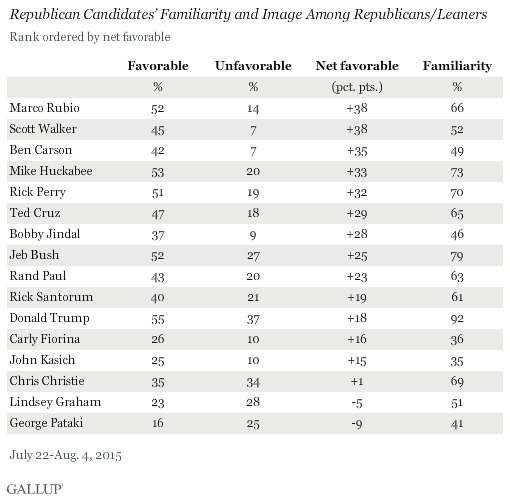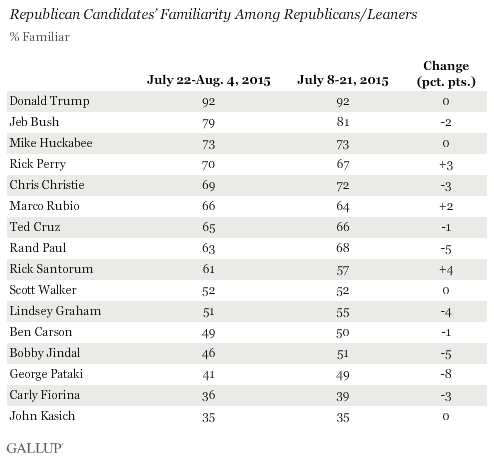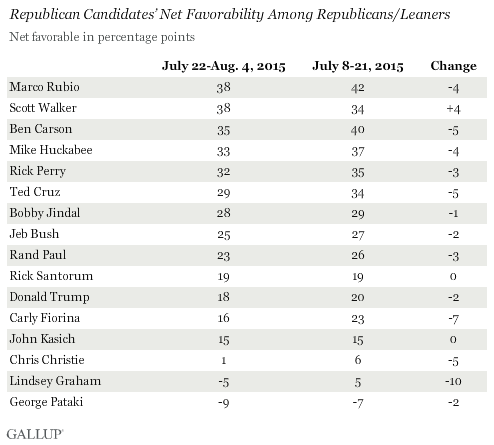Story Highlights
- Rubio and Walker at top of list with 38% net favorable ratings
- Kasich has lowest familiarity of any candidate; stands to gain
- Christie and Trump have less positive images than others in debate
PRINCETON, N.J. -- Just ahead of the first official Republican debate of the 2016 presidential campaign, Republicans give Marco Rubio and Scott Walker the highest net favorable ratings among any of the major 16 candidates running for their party's nomination, followed by Ben Carson, Mike Huckabee and Rick Perry. At the other end of the spectrum, George Pataki, Lindsey Graham and Chris Christie have the lowest net favorable ratings.

These data are based on the latest two weeks of interviewing conducted via Gallup Daily tracking, July 22-Aug. 4, with each candidate rated by more than 1,000 Republicans and Republican-leaning independents. Former Virginia Gov. Jim Gilmore entered the race last week and is now included in Gallup's candidate tracking, but his entry was too late for him to be included in these analyses.
These results provide an important update on each candidate's fundamental standing among national Republicans in the election race. As was true two weeks ago, Republicans' familiarity with these candidates varies widely, as do their ratings of each candidate. The table at the end of this article shows the trends in candidate familiarity and net favorable ratings.
The net favorable measure, which simply subtracts the percentage who have an unfavorable opinion from the percentage who have a favorable opinion, is a useful, shorthand way of determining a candidate's relative popularity among their fellow Republicans nationwide. This sentiment is not necessarily related to the candidates' name recognition. Both Walker and Carson, for example, are familiar to only about half of Republicans, yet are viewed quite positively by those who know them. On the other hand, Donald Trump and Christie are much better known, but have well-below-average net favorable scores, with Trump sixth from the bottom on that dimension and Christie third from the bottom.
Other candidates such as Rubio, Huckabee and Perry are both well-known and well-liked. Graham and Pataki provide a mirror image of that positioning; both are not well-known and not well-liked among those who do know them.
Kasich, Carson and Walker, With Low Familiarity, Stand to Gain From Inclusion in the Debate
The major event in the Republican campaign at this juncture is the inaugural set of debates to be broadcast on Fox News on Thursday. Only 10 candidates will be included in the prime-time debate at 9 p.m. EST; the other seven will debate at an earlier 5 p.m. EST time slot. Fox News determined which candidates would be included in the desirable prime-time event based on an average of national Republican horse race polls. In the end, small differences in average standings among candidates at the low end of the standings determined who ultimately was included in the debate.
Ohio Gov. John Kasich is one candidate who has a great deal to gain by his inclusion in the debate. He was one of the last to announce his candidacy and is familiar to only 35% of Republicans -- putting him dead last on this dimension among the 16 candidates Gallup has tracked. His net favorable rating puts him in the bottom half of all candidates. The debate thus provides an important opportunity for him to begin to become better known and more of a player in the campaign.
Physician Carson and former Wisconsin Gov. Walker are also positioned to enhance their relatively weak name identifications, although both are already well-liked by those who know them, putting them near the top in terms of their net favorable rating.
Christie and Trump Face Challenge of More Negative Images
New Jersey Gov. Christie does not have a major name identification issue; he is familiar to 69% of Republicans. But Christie has an image problem, with a net favorable rating of +1, meaning that almost as many Republicans who know him have an unfavorable opinion as a favorable opinion. Christie's challenge in the debate, therefore, will be to change his image rather than to become better known.
To a degree, Trump faces the same challenge as Christie. Trump has, by far, the highest familiarity of any of the 16 candidates, but a familiarity that is based more on his history as a businessman and media personality than on anything political. Trump also has the highest unfavorable rating -- 37% -- of any of the candidates. All eyes will be on Trump, who will occupy center stage during the debate, and thus he will have the opportunity to define himself as a candidate to the millions of Americans who, for the first time, will see him in a traditional political setting.
There is some good news for Trump in the latest update of these data. Despite the extraordinary attention he has received in the media in recent weeks, much of it negative, his standing among Republicans has held steady. His current +18 net favorable rating is essentially the same as his +20 net favorable rating two weeks ago.
Perry and Jindal Are Not in Debate, Despite Being Well-Liked by Republicans
Former Texas Gov. Perry and, to a lesser degree, Louisiana Gov. Bobby Jindal are two candidates with a significant discrepancy between their images among Republicans and their failure to be included in the prime-time debate. Both are in the top 10 candidates based on net favorability. Perry essentially ties Huckabee with a +32 net favorability rating, based on 51% favorable and 19% unfavorable ratings, and Jindal has a +28 rating, higher than five candidates who will be in the debate (Bush, Paul, Trump, Kasich and Christie). Perry and Huckabee, both former governors from adjacent states, not only have similar net favorable scores but also similar familiarity scores. Huckabee is in the prime-time debate while Perry is not.
Bottom Line
The effect of this much-anticipated debate on the images of the Republican candidates is unpredictable at this point. Trump's presence and the anticipation surrounding the question of who would make it into the prime-time debate will almost certainly mean that the audience will be larger than is typically the case for an event like this six months before the first votes are cast.
Many media observers will focus on highlighting gaffes or high-visibility sound bites that will help them write headlines about who may have won or lost the debate. But the long-term effects of these types of events are not always clear. It's possible that not much will change, particularly given the constrained format in which candidates have only 60 seconds to answer the moderators' questions. In any event, the impact of this particular debate on making lesser-known candidates better known, improving the images of those who are less popular or perhaps hurting the images of other candidates will be measurable in the days that follow Thursday night's event.


Survey Methods
Results for this Gallup poll are based on telephone interviews conducted July 22-Aug. 4, 2015, on the Gallup U.S. Daily survey, with a random sample of 3,147 adults who identify as or lean Republican, aged 18 and older, living in all 50 U.S. states and the District of Columbia. Each candidate was in turn rated by a random subset of Republicans during this time period, with the sample sizes rating each candidate ranging from 1,022 to 1,115. For results based on these samples of Republicans, the margin of sampling error is ±4 percentage points at the 95% confidence level.
The base sample of national adults used in this research includes a minimum quota of 50% cellphone respondents and 50% landline respondents, with additional minimum quotas by time zone within region. Landline and cellular telephone numbers are selected using random-digit-dial methods.
Learn more about how the Gallup U.S. Daily works.

